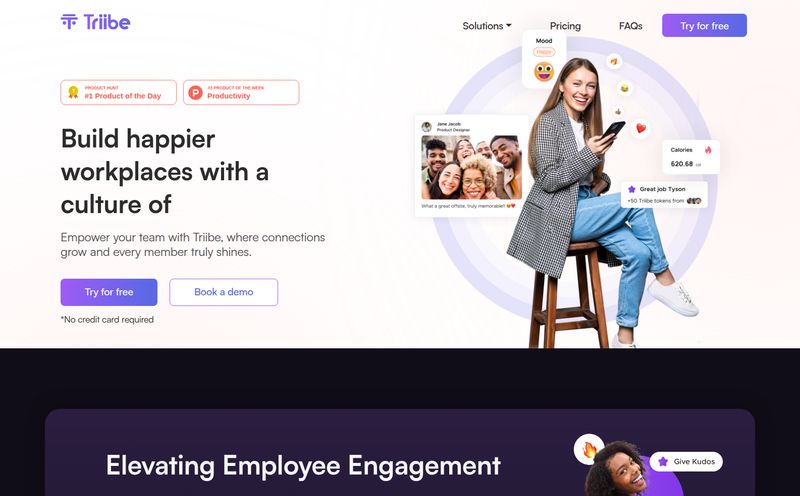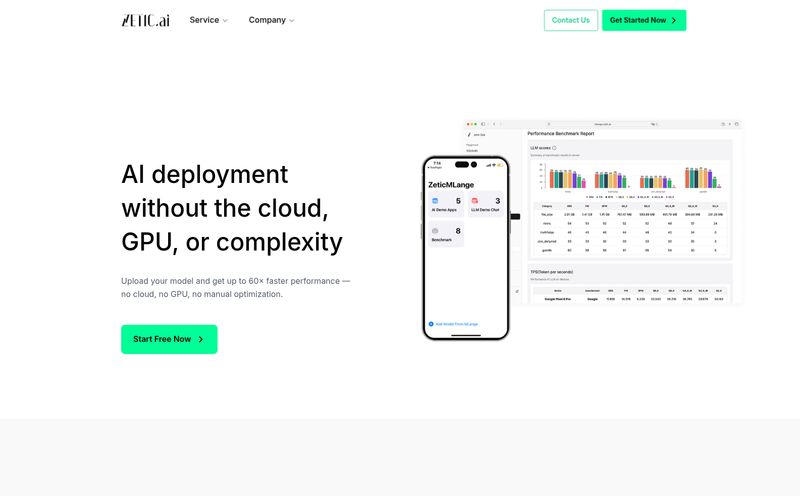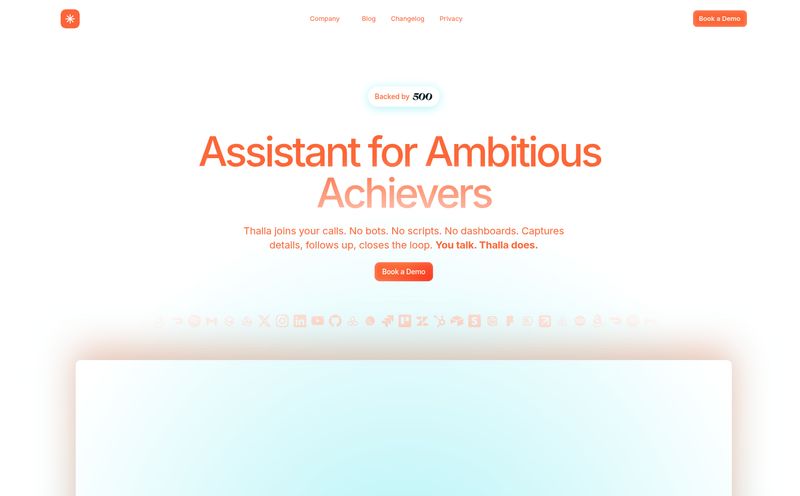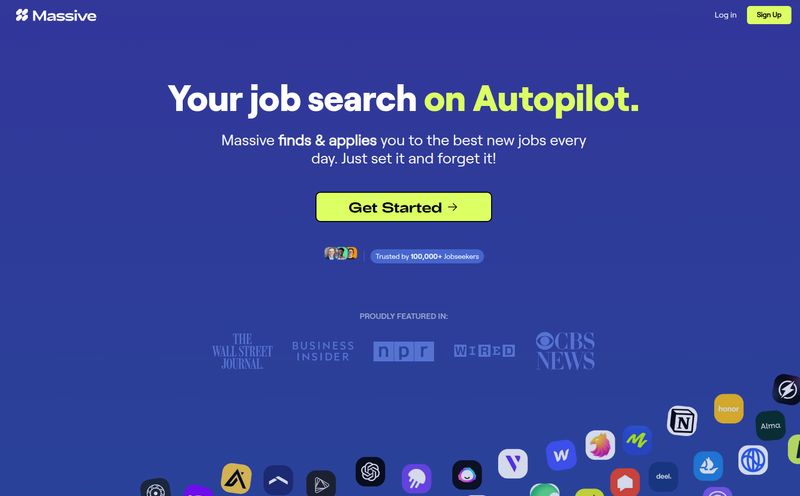In the world of SEO and digital marketing, we live and die by data. We track clicks, analyze traffic, and A/B test everything from button colors to headlines. We're obsessed with personalization and efficiency. So when I see a tool that promises to bring that same data-driven, hyper-personalized approach to fitness, my ears perk up. But let's be honest, my skepticism meter also goes through the roof.
We've all been there, right? You decide it's time to get serious about your health. You google "best workout for fat loss" or "easy healthy meal plan" and get buried under a mountain of generic, one-size-fits-all advice. It’s the content marketing equivalent of shouting into the void. Most of it is useless because it’s not for you.
Enter BodyCompAI. The pitch is slick: upload a photo, and an AI analyzes your physique to create a completely custom workout and nutrition plan. It's like having a personal trainer and a nutritionist who, instead of asking you a bunch of questions, just… looks at you. It sounds like something straight out of science fiction. But does it actually work, or is it just another shiny object in the ever-growing tech landscape?
So, What Exactly is BodyCompAI?
Think of it this way. A good personal trainer assesses your current state—your strengths, weaknesses, body composition—before they ever write a single workout. BodyCompAI aims to do the same thing, but with an algorithm. You give it a photo, and its AI model analyzes your body composition. From there, it spits out a plan designed to, as they say, "build strength where you need it."
It’s not just about getting a random workout. It’s about getting a strategic plan based on a snapshot of your current physical reality. In my world, that's the difference between just buying a bunch of random backlinks and executing a targeted link-building campaign based on a competitive analysis. One is guesswork; the other is strategy.
My First Encounter with the AI Trainer
I have to admit, the sign-up process was smooth. The landing page is clean, and the promise is front and center: "Unlock Your Potential with Personalized Fitness." They offer a 14-day free trial, which is always a green flag in my book. It shows confidence in the product.
The moment of truth, of course, is the photo upload. I'd be lying if I said there wasn't a brief moment of hesitation. We're all a bit more conscious of our data privacy these days. Snapping a shirtless photo and handing it over to an AI feels… intimate. But, for the sake of a good, honest review (and my own curiosity), I did it. The whole process was quick, and within minutes, I was looking at a dashboard with my name on it.
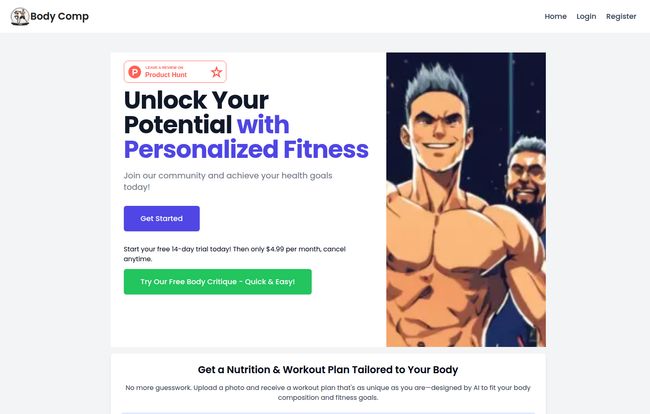
Visit BodyCompAI
Breaking Down the AI-Generated Plan
So what does a robot's idea of a perfect fitness plan look like? It's surprisingly detailed and, dare I say, logical. It’s not just a list of exercises; it's a structured strategy broken into two main parts.
The Workout Blueprint
The workout plan I received was a 5-day split focused on Strength and Conditioning. It looked something like this:
- Monday: Strength training, focusing on compound movements. Think squats, deadlifts, bench presses. The big stuff.
- Tuesday: More strength work.
- Wednesday: Active recovery. This was a nice touch. Not just 'rest,' but active things like light stretching or a long walk to improve flexibility and aid muscle repair.
- Thursday: Back to strength.
- Friday: Cardio day. Not just "run on a treadmill for an hour," but a prescription for 45 minutes of steady-state cardio.
- Weekend: Rest. True rest.
This felt more thoughtful than 90% of the free plans floating around the internet. It was a balanced approach that understood the importance of recovery—something even experienced gym-goers forget.
Your Personalized Fuel
The nutrition advice was equally specific. It didn’t just say "eat protein." It gave me a sample day of eating, like:
- Breakfast: High-protein Greek yogurt with almonds and blueberries.
- Lunch: A grilled chicken breast with a quinoa salad.
- Dinner: Baked salmon with steamed broccoli and sweet potato.
The best part? It mentioned that the plans are adaptable to dietary restrictions. As someone who's tried various eating styles over the years, from keto to intermittent fasting, that flexibility is huge. It shows the system isn't just a rigid set of rules but a framework you can work with.
But Can an AI Really Analyze a Photo Accurately?
Here's the million-dollar question. Is this AI analysis legit? Let's be real: it's not a medical-grade DEXA scan. It's an AI making an educated guess based on visual data and patterns it has learned. Some might see this as a major flaw. They'll say, "An AI can't possibly be as accurate as a professional assessment!"
And you know what? They're probably right. But I think that misses the point.
In the SEO game, we use tools like Ahrefs or SEMrush to estimate domain authority and keyword difficulty. Are those metrics 100% perfect reflections of Google's internal ranking factors? Of course not. But are they incredibly useful directional tools that inform our strategy and get us 80% of the way there? Absolutely. I see BodyCompAI in the same light. It gives you a powerful, data-informed starting point that is miles ahead of shooting in the dark. It might not be perfect, but it's a hell of a lot better than nothing.
The Price of AI-Powered Fitness
This is often where these cool new tech tools fall apart. They come with a subscription price that makes you choke on your protein shake. But BodyCompAI is surprisingly affordable. Here's the deal:
| Plan | Cost | Details |
|---|---|---|
| Free Trial | $0 | A full 14-day trial to test everything out. |
| Monthly Subscription | $4.99 / month | Full access to personalized plans, with the ability to cancel anytime. |
Yeah, you read that right. Five bucks a month. That's less than a single oat milk latte in most major cities. When you compare that to the cost of a human personal trainer, which can run anywhere from $50 to $150+ per hour, the value proposition is insane. It makes personalized guidance accessible to pretty much everyone.
The Good, The Bad, and The AI
No review is complete without a simple breakdown. After spending time with the platform, here are my unfiltered thoughts.
What I Liked
The personalization is the obvious star. Getting a plan that feels like it was made for you is a game-changer for motivation. The convenience is another huge plus; it's all right there on your device, no appointments necessary. And honestly, the price is just unbeatable. For anyone who's felt priced out of personal training, this is a breath of fresh air.
Where It Could Improve
The reliance on a photo upload is a double-edged sword. It's what makes the personalization possible, but it's also a potential privacy hurdle for some. And while the AI is impressive, it's not a human. It can't watch your form, offer a word of encouragement when you're struggling on that last rep, or adjust your plan in real-time based on your feedback. It’s a tool, not a companion.
Who Should Use BodyCompAI? (And Who Can Skip It)
This tool isn't for everyone, and that's okay. If you're a data geek like me who loves seeing how technology can optimize different parts of life, you'll probably love this. It's also fantastic for beginners who are overwhelmed and need a clear, structured path to follow. Or maybe you're an intermediate gym-goer who's hit a plateau and needs to shake things up with a new, targeted strategy.
However, if you're an elite athlete or a professional bodybuilder who already works with a high-level coach, this might be too basic for your needs. Likewise, if you're someone who genuinely needs the accountability and in-person connection of a human trainer to stay motivated, the AI-only approach might leave you feeling a bit cold. And that’s perfectly fine.
My Final Verdict
So, is BodyCompAI a gimmick or the future? I think it's a bit of both, in the best way possible. It’s not going to replace the world's best human coaches. But what it does do is democratize personalized fitness. It takes a level of strategic planning that was once reserved for those who could afford a pricey trainer and puts it in the palm of anyone with a smartphone and five dollars.
For me, it’s a powerful tool that provides a fantastic, data-informed starting point. It removes the guesswork and replaces it with a clear, actionable plan. And in fitness, as in SEO, having a clear plan is half the battle won.
Frequently Asked Questions
- How does the BodyCompAI analysis actually work?
- It uses a trained AI model to analyze the photo you upload. Based on visual cues and patterns from a huge dataset, it estimates your body composition—like muscle mass and body fat percentage—to create a tailored plan.
- Can the nutrition and workout plans be adjusted for my specific needs?
- Yes. The platform states that the nutrition plans can be adapted for various dietary restrictions. While the workout is generated for you, the principles can be adapted based on equipment availability and fitness level.
- Is my uploaded photo kept private and secure?
- While I'm not a company insider, standard practice for tools like this involves encrypting user data and having a strict privacy policy. It's always a good idea to read their Privacy Policy for the specifics, but they seem to be a professional outfit.
- What happens after the 14-day free trial ends?
- After the 14-day trial, your account will be automatically enrolled in the monthly subscription, which costs $4.99 per month. You can cancel at any time.
- Is this platform suitable for complete beginners?
- Absolutely. In fact, it might be most suitable for beginners. It provides the structure and guidance that new gym-goers desperately need, helping them avoid the common mistakes and frustration that cause so many people to quit.
- Can I track my progress with BodyCompAI?
- Yes, the platform includes progress tracking features. This allows you to monitor your changes over time, which is a key component for staying motivated and making adjustments to your plan as you get stronger and fitter.
